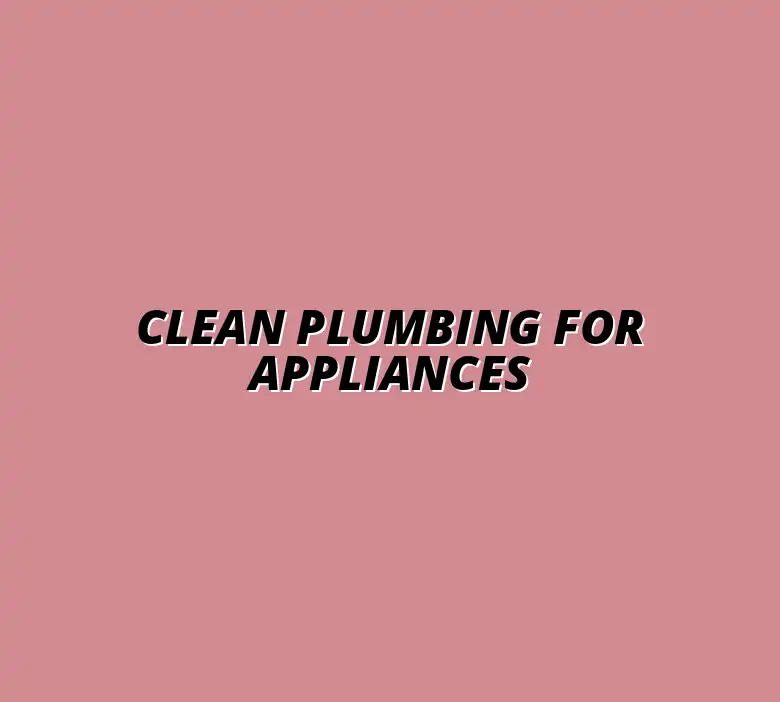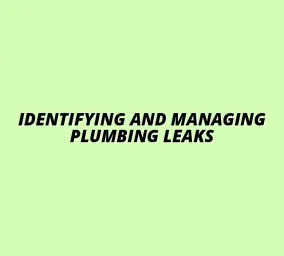Clean Plumbing for Appliances
Understanding the Importance of Clean Plumbing in Appliances
When we think about our household appliances, we often focus on how they look and their features. However, the condition of the plumbing connected to these appliances is equally important. Clean plumbing ensures that your appliances function efficiently, ultimately leading to better performance and a longer lifespan.
Not only does clean plumbing help in the smooth operation of your appliances, but it also contributes to energy efficiency. When pipes and hoses are clogged or dirty, appliances like dishwashers and washing machines can consume more energy, leading to higher utility bills. Regular maintenance of plumbing is essential to avoid these unnecessary expenses. For helpful tips on maintaining your entire plumbing system, check out this guide on easily maintaining your plumbing system.
The Relationship Between Clean Plumbing and Appliance Efficiency
Appliance efficiency is significantly affected by the cleanliness of plumbing systems. When the plumbing is clean, water can flow freely, allowing appliances to operate at their optimal level. This means your dishwasher cleans dishes better, and your washing machine washes clothes more thoroughly.
- Optimal Water Flow: Clean plumbing ensures that water reaches your appliances without obstruction.
- Reduced Energy Usage: Efficient water usage can lead to lower energy bills.
- Extended Appliance Life: Regular maintenance can prevent breakdowns and costly repairs.
By maintaining clean plumbing, you not only enhance the performance of your appliances but also contribute to a sustainable household. Taking these steps can lead to fewer repairs and replacements, which is beneficial for both your budget and the environment!
Common Issues Caused by Dirty Plumbing in Dishwashers and Washing Machines
Dirty plumbing can lead to a host of issues that affect the performance of your appliances. For dishwashers, build-up from food particles can cause blockages in the drain, leading to poor cleaning results. If you're facing a dishwasher that won't drain, this guide on fixing a dishwasher that won't drain can be very helpful. Similarly, washing machines can suffer from issues like mold growth in pipes if not regularly cleaned.
- Clogs: Blocked drains can cause water to back up, leading to inefficient cleaning.
- Unpleasant Odors: Stagnant water due to clogs can create foul smells.
- Leaks: Dirty or damaged plumbing can lead to leaks, which can damage your floors and walls.
Understanding these common issues is vital in taking proactive measures. Cleaning your plumbing regularly can help avoid these problems, ensuring that your appliances stay in good working condition. Learning about the essential benefits of regular drain cleaning is a great first step.
FAQs About Keeping Dishwasher and Washing Machine Plumbing Clean
When it comes to the plumbing in your appliances, questions often arise. Understanding the common issues and maintenance needs is essential. Here, I’ll address some frequently asked questions that can help you keep your dishwasher and washing machine plumbing in top shape!
What Are Common Signs of Clogged Dishwasher or Washing Machine Plumbing?
Being aware of the signs of clogged plumbing can help you take action before a minor issue becomes a major problem. Here are some common indicators to look out for:
- Drainage Issues: Water pooling at the bottom of your dishwasher or washing machine.
- Unpleasant Odors: Foul smells coming from your appliance can signal a clog.
- Slow Draining: If water takes longer than usual to drain, it might be time to check for blockages.
- Strange Noises: Gurgling or grinding sounds can indicate something is stuck in the plumbing.
Being vigilant about these signs can save you from costly repairs and ensure your appliances run smoothly. If you're facing a clogged drain emergency, learn more about clogged drain emergency solutions. If you notice one or more of these issues, it's best to investigate further.
How Often Should I Clean the Plumbing of My Dishwasher and Washing Machine?
Regular cleaning of your appliance plumbing is crucial for maintaining efficiency and preventing clogs. Here's a simple guideline on cleaning frequency:
- Dishwasher: Clean the plumbing components every 1 to 3 months, depending on usage.
- Washing Machine: Inspect and clean the plumbing every 3 to 6 months to prevent buildup.
- Deep Cleaning: A thorough deep clean should be done at least once a year for both appliances.
Following these guidelines can help keep your appliances running efficiently and extend their lifespan. For more advice on preventing bathroom drain clogs year-round, consider this helpful resource: Prevent Bathroom Drain Clogging Year-Round. Remember, a little maintenance goes a long way!
Summarizing Essential Practices for Healthy Appliance Plumbing
In this section, I'll summarize the key practices you can adopt to maintain healthy plumbing in your dishwasher and washing machine. A little awareness and action can prevent bigger headaches down the road!
Recap of Key Tips for Dishwasher and Washing Machine Maintenance
To ensure your appliances function well, consider these essential maintenance tips:
- Regularly inspect and clean drain filters.
- Check hoses for wear and tear.
- Keep an eye out for clogs and address them promptly.
- Use natural cleaners like vinegar and baking soda regularly.
By incorporating these practices into your routine, you can significantly enhance the performance and longevity of your appliances. Maintenance is not just about fixing problems; it’s about preventing them! Regular water heater maintenance is also crucial; here's a helpful water heater maintenance checklist.
Encouraging Proactive Measures to Ensure Long-Term Appliance Functionality
Taking proactive measures goes beyond just cleaning. Here are some strategies to ensure your appliances remain in optimal condition:
- Establish a regular maintenance schedule.
- Educate yourself about the specific needs of your appliances.
- Maintain a clean environment around your appliances to reduce dust and debris.
- Consult with a professional for periodic inspections if necessary. For plumbing emergencies in Tyseley, Birmingham, consider contacting a local plumber.
Implementing these proactive measures will not only help you avoid plumbing issues but also enhance the overall efficiency of your dishwasher and washing machine. Keeping your appliances happy means fewer worries for you!






